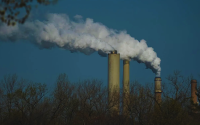Common Dreams / Published on Sunday, March 20, 2005 by the Los Angeles Times
Christie Whitman's autobiography is, as always with politicians, about her courage. She stands up to sexism, she stands up to class-ism (ceasing, for instance, to wear pearls to work because it just encouraged all those nasty stereotypes about "wealthy women who enter politics"). Mostly the former New Jersey governor and onetime head of the Environmental Protection Agency stands up to "social fundamentalists" who seek to impose "rigid litmus tests" on their fellow Republicans.
Well, bully for her. But in fact, Whitman had the chance that few politicians ever get. She found herself in a place where actual courage would have done great — maybe even historic — good. And she punted spectacularly. It's a story worth rehashing for the light it sheds on how easily moderates and centrists are run over by zealots, a subject that bears on current debates such as the one over Social Security.
The saga begins on the presidential campaign trail in 2000, when candidate George W. Bush promised he would include carbon dioxide — the gas that is the major cause of greenhouse warming — on the list of pollutants that power plants would need to start reducing. As a candidate, he didn't endorse the Kyoto treaty on climate change, which most of the developed world has since ratified; he didn't make any wild-eyed promises (like the ones his dad had made) to actually cut the carbon the United States pours into the atmosphere. But he did imply in his campaign that he'd take global warming seriously — a promise that Whitman reveals was repeated in his transition planning documents, which listed "mandatory caps on CO2 emissions" as a "campaign promise."
Whitman inherited this promise when Bush named her to head the EPA. A few weeks into the job, before leaving for a summit of the G-8 major industrial nations in Italy, she sat down with White House advisor Condoleezza Rice and "made sure she knew I would be touting the president's campaign commitment to a mandatory cap … and she agreed that this was a sound approach. I also checked with the office of the White House chief of staff about the issue, and got the green light from it as well."
Her backside thus covered, she assured her G-8 counterparts and the world's media that the president's campaign commitment was "solid and that the administration sincerely agreed that global climate change was a serious problem that deserved attention" — a stance that went over well in Europe, whose people and leaders believe that the laws of chemistry and physics are in fact real.
On arriving home, however, the president summoned Whitman to the Oval Office. "I spent the weekend preparing my arguments because I knew there would be no time for a long drawn-out discussion. But as soon as the president and I sat down, I realized that I wasn't there to state my case — I was there to be told he had decided to reverse himself."
As she walked out the door, Vice President Dick Cheney muttered a brief hello — and then made his way to Capitol Hill to release a letter from the president stating categorically that carbon dioxide was not a pollutant and that there would be no caps.
I can't think of an instance in modern U.S. history when a Cabinet member had been so neatly, quickly and publicly kneecapped. But instead of doing the right thing, Whitman did nothing.
In a spectacular display of political cowardice, she settled down at the EPA, devoting herself to minor pieces of legislation such as the one that extended limits on diesel emissions to vehicles for "non-road uses," like tractors and backhoes. Not a bad law, but in the end no big deal. Whitman had a chance to make a real difference on what one panel of Nobelists after another has called the worst dilemma human civilization yet has faced, and she'd passed it up.
Imagine what would have happened if she had simply quit, accusing the president of reneging on a promise, undermining relations with our allies and, more to the point, neglecting the most crucial environmental challenge that's ever appeared.
It would have lifted the issue out of its relative obscurity and set it at the center of American political debate. Whitman could have done more to move the United States off the dime about global warming than any politician before or since.
But that would have meant real courage, the kind that sacrifices personal ambition, or even more, personal identity, for something larger than oneself. Whitman oozes not courage but party (and class) loyalty from every page of her book. (Beginning with the account of the summer she spent in camp making a leather golf tee holder for her parents' friend Dwight Eisenhower).
Her fealty is to the old GOP, the party of privilege and noblesse oblige and moderation, in which she grew up, and she is right to prefer it to the new GOP, the party of intolerance and zealotry. But imagine a politician whose fealty was actually to something larger.
Bill McKibben is a scholar in residence at Middlebury College and the author of "The End of Nature" (Anchor, 1999)






